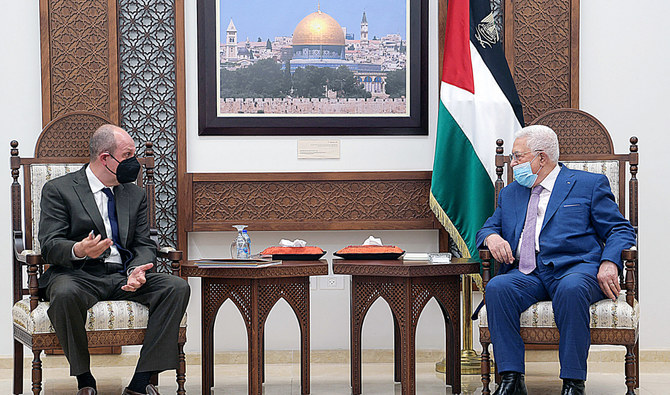CHICAGO: The Biden administration is quietly getting things done to bring Israelis and Palestinians together, working outside of the headlines to improve the lives of the people, Deputy Assistant Secretary of State for Israeli and Palestinian Affairs Hady Amr said in an exclusive interview with Arab News.
Amr, who defined his responsibilities as “coordinating US foreign policy vis-a-vis Israel and the Palestinians (for the State Department),” said that US President Joe Biden and Secretary of State Anthony Blinken are committed to ensuring that Arab Americans have a “real role” in that process.
In his first public interview since being appointed on Jan. 20, 2021, Amr said that a primary responsibility is to “coordinate US foreign policy vis-a-vis Israel and the Palestinians individually and also in efforts to bridge the divide between the two” to create an atmosphere where peace becomes possible. He said that the Biden administration has made headway on that front.
“If you are an ordinary person living in the West Bank and Gaza Strip, you have seen some changes in the past year. Israel has increased the water supply in Gaza by 40 percent. It doesn’t sound like much but it really makes a difference to people’s lives,” Amr told Arab News.
“Israel has granted over 10,000 work permits to Palestinians in Gaza to work in Israel. That was not the case a year ago and this is a higher number than at any time in many, many years. And as we just heard in recent days, Israel has announced it will increase that number to about 20,000. And, as a result of that, we have seen unemployment fall in meaningful ways for the people of Gaza for the first time. And so, the situation is improving.”
Amr gave another example: “Israel has been issuing identification cards to thousands of Palestinians in the West Bank who didn’t have them. These aren’t just administrative issues in our view or economic issues. They are issues that touch on freedom of movement. Of having a residency permit that allows you to travel. We hope and expect they are making a real difference in people’s lives.”
He said that there are many examples of how pressures on Palestinians are easing, which in turn helps create a positive atmosphere outside of the news media headlines to get things done.
But Amr stressed that the Biden Administration through Secretary of State Anthony Blinken is “working quietly and relentlessly on a range of other issues behind-the-scenes” that he cannot detail.
“He also said we were going to work behind the scenes through quiet relentless diplomacy to that end and so that is our core philosophy,” Amr explained, referring to Blinken.
“The secretary of state believes that is important in its own right but also as a means to get back to a negotiated solution. That is kind of the big picture.”
BACKGROUND
- US Deputy Assistant Secretary of State for Israel and Palestinian Affairs Hady Amr defined his responsibilities as ‘coordinating US foreign policy vis-a-vis Israel and the Palestinians.’
- Amr said that he does not want to discuss efforts that are currently being pursued to bring Israelis and Palestinians closer together for peace.
- Amr said that he was honored to be asked by the administration of President Joe Biden to work under Antony Blinken at the State Department.
- In the 2000 presidential election campaign, Amr served as national director of ethnic engagement for candidate and former vice president, Al Gore.
Amr said that he doesn’t want to discuss efforts that are currently being pursued to bring Israelis and Palestinians closer together for peace. “I don’t want to get into that because I find that the more we talk about these things upfront, the less likely they are to happen. But my hope is that we are going to continue working on such steps that improve the quality of life for ordinary people, which we hope begin to create a confidence and get us back in the direction we want to go to.”
Amr said: “The United States has restarted what we view as vital assistance to the Palestinian people. We provided over half a billion dollars in the last year, over 400 million of that through UNRWA, the UN agency which provides services. And we feel that these funds make a real difference improving the quality of life for ordinary people.”
Amr said that he was inspired as a child by the words of Rev. Dr. Martin Luther King Jr., who said “Injustice anywhere is a threat to justice everywhere.” The quote is embedded among several at the MLK Memorial in Washington, DC.
Amr’s career has included working at the World Bank, the World Economic Forum, and with various United Nations organizations, including UNICEF, where he said, “I have always tried to infuse the concept of bringing people the equality and justice they deserve in that work.”
In the 2000 presidential election campaign, Amr served as national director of ethnic engagement for candidate and former vice president, Al Gore. He later served as deputy assistant administrator for the Middle East at the United States Agency for International Development, “helping to manage foreign assistance programs.” In 2013 he spent four years working as deputy special envoy for Palestinian-Israeli negotiations for Secretary of State John Kerry.
Amr said that he was honored to be asked by the Biden administration to work under Blinken at the State Department and to pursue a policy to treat both Israelis and Palestinians equally.
“President Biden articulated that when he said he believes Israelis and Palestinians equally deserve to live safely and securely and enjoy equal measures of freedom, prosperity and democracy,” Amr said.
As Arab Americans prepare on April 1 to commemorate “Arab American Heritage Month,” Amr insisted that Arab Americans are playing a significant role in the Biden administration.
“Arab Americans absolutely have a role. As a young person growing up and then as a college student, I never saw names like ours in government. I’m not saying they weren’t there, but they were invisible. At some point I promised myself that if I ever got the chance to try to change that, I would. I want my kids to grow up in an America where it is a normal thing for Arab Americans to have a visible role in government,” Amr said.
“Even though Arab Americans only make up 1 percent of the US population, among the tens of thousands of employees at the state department, several hundred are now Arab Americans, from entry level to senior level folks. That wasn’t the case when I arrived in Washington decades ago. Very often I felt like I was the only Arab American in the room.”
Today, there are “many Arab Americans here in the Middle East bureau where I work,” as well as an “Arab Americans in Foreign Affairs Affinity Group,” which was set up more than a decade ago and has about 400 members, he said. The “Affinity Group” is one of many representing ethnic American constituents such as African Americans, Hispanics and Asians.
“Alongside of the diversity that is America, there are Arab Americans at every level of the State Department. The Secretary of State’s Chief of Staff Suzy George is an Arab American. There are Arab Americans throughout the department, including here in the Bureau of Near Eastern Affairs, on my team alongside of a full range of diverse Americans from all backgrounds,” Amr said.
“It really is up to the (Arab) community to decide whether or not the president delivered on his commitments. But what I do see is that this is an administration that is committed to delivering on things. There are hundreds of Arab Americans in the civil service here at the State Department and in the foreign service that are rising up through the ranks.”
Amr said that diversity and inclusion “will contribute to peace between Israelis and Palestinians.”
Amr has become a key player in helping the Biden administration define its policies toward the Israelis and Palestinians. Last year, reports surfaced that Biden might name him to serve as US Consul-General to Palestinians. Blinken had announced in May 2021 his hopes to re-establish the US Consulate to the Palestinians in Jerusalem, where the consul-general would serve. However, the idea remains on hold.
“The peace, the freedom, the security and the prosperity that we all seek for all Israelis and Palestinians is something that is hard work. It’s not always a headlines thing. It’s things like work permits for Palestinians from Gaza to be able to work in Israel that have helped bring down the unemployment rate in Gaza, residency permits for Palestinians in the West Bank to be able to lead more normal lives, providing more water, providing more electricity.” Amr said.
“Peace is not just about the big headline issues. It’s all about building up and addressing concerns that affect ordinary peoples’ lives. It is also about preventing things that we don’t want to happen from happening as well. Essentially what we are trying to do is accentuate the positive, minimize the negative and try to move forward and
build good relationships that just lift up ordinary people’s lives as best we can.”























